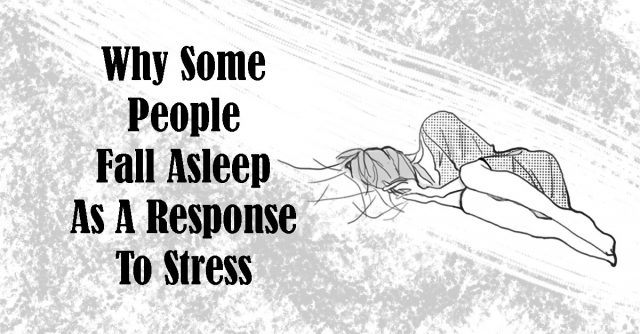Have you ever been so worked up, afraid, anxious, and stressed-out that you fell asleep? One friend of mine says that it happens to her all the time.
“Last night,” she says, “I had an argument with my husband about our spending habits and next thing I remember I am in my bedroom with my face down into the pillow.” She says that she didn’t mean to fall asleep, she just felt so tired at that moment from the disagreement and there was nothing she could do.
When I think about it, it happened to me many times. Last time I remember was when I broke up with my boyfriend and I was under a lot of stress and pain during that period that I literally couldn’t get out of bed. I was sleeping for 14 hours a day. I couldn’t keep myself awake no matter how much I tried.
And even though this has happened to me many times, I still cannot figure out why my body reacts to stress in this way. In our biology classes, we were taught that when we are faced with a stressful situation, our bodies immediately enter fight-or-flight mode putting our body on alert – our breathing increases, our hearts start beating faster, our metabolism speeds up, and blood rich with oxygen is pumped to our bodies’ large muscles. This is our bodies’ way to prepare for an attack, or to run away fast.
Of course, no one wants their body to be always in fight-or-flight mode. If our stress response system is too reactive it will have many negative consequences which can lead to chronic anxiety and depression, and many sleepless nights.
However, it seems that my body’s response to stress is to just shut down. So, I began to wonder, what is wrong with me? What’s wrong with my body? Where is the fight in me?
In psychology, there is an old concept that is called “learned helplessness” which can be defined as: “If, during early development, a living thing comes to understand that it is helpless, it will continue to perceive a lack of control, no matter if the context changes.”
I remember that when I hit puberty, my parents divorced, and I began to escape into sleep because I didn’t want to face the reality. And I continued using sleep as my escape route even today.
Before my parents divorced, they were fighting a lot, and usually in the living room that was just beneath my bedroom. I don’t remember much, but what I do remember is that I didn’t feel angry or sad – I felt powerless. I was forced to shrug my shoulders, close the door and shut my eyes. Because, what one can do in this situation? Tell them to divorce? Of course not.
Sleeping as coping mechanism worked for me back then. I buried my feelings and started to move on with my life. I studied hard to get the highest grades in school, I had friends, and from the outside, it looked like I live a perfect life.
And now, at 25, I still deal with my internal conflicts by shutting the door and going to sleep. Because, as the psychiatrist John Sharp said:
“Our feelings are always in the past. This is something that’s really outlived its adaptive value.”
However, I feel that I am not helping myself. After all, sleeping can’t solve anything. It is simply a way to just shut our eyes for a moment and escape from the problem. But we are not escaping anything. In fact, we are making it worse and more real than it is because sleep forces us to relieve the emotional situation and to process it again when we wake up.
So, if you manage to stay awake until the traumatic event passes, chances are that the memory from that event and your emotional response to it will weaken.
Of course, there is a positive flip-side to this.
“You can be driven to sleep simply by having a lot of emotional memories to process.”
This is probably an explanation why little kids sleep so much. Because their short-term memory storage is small, and they too often need to consolidate memories and unload experiences.
Sleep can teach us how to cope better with interpersonal conflicts. Because when we wake up from sleep, we are feeling different – the stress, the tenseness, the frayed nerves, the sickness in our stomach, are all gone.
So, sleep is not bad after all. The only problem could arise when you wake up – but supposedly, you will have a much better understanding of the situation and hopefully, you will approach it with a clear head.


